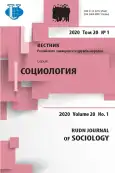Local development initiatives in the Lake Ladoga Region: Reasons for success and approaches to funding
- Authors: Nikula J.1, Kopoteva I.1,2
-
Affiliations:
- University of Helsinki
- Russian Presidential Academy of National Economy and Public Administration
- Issue: Vol 20, No 1 (2020)
- Pages: 102-114
- Section: Contemporary society: the urgent issues and prospects for development
- URL: https://journal-vniispk.ru/2313-2272/article/view/322856
- DOI: https://doi.org/10.22363/2313-2272-2020-20-1-102-114
- ID: 322856
Cite item
Full Text
Abstract
The peripheral (rural) regions in most countries face four vicious circles that contribute to their low level of development and inability to achieve the sustainable level of development. The first vicious circle is related to demography and is caused by the vulnerable population; very few young people and imbalance of women and men lead to poor economy, i.e. dominance of subsistence economy over production or trade; unfavorable age structure combined with poor services lead to very low birth rate and high levels of migration. The second vicious circle of remoteness is related to the fact that poor infrastructure does not attract businesses or new residents in the area, which contributes to high levels of migration as young and working-age population, especially families with young children, move out. The third vicious circle is related to education: the low level of education and skills mean that there is no labor force available in the region, which prevents business from entering the local market. Lack of employment means high poverty risk, which again accelerates migration from the rural areas. All these processes undermine the possibilities for local development simply because there is not enough human or economic capital to sustain rural development. These negative trends are not only typical for rural areas of Russia but have a strong impact on peripheral areas of many other post-socialist and European countries. The governments in Russia and European Union introduced various programs and measures to promote local development so that to overcome the negative consequences of all the mentioned vicious circles. In the first part of the article, the authors evaluate some local development efforts funded by the Ladoga Initiative project, successful and failed projects aimed at overcoming the vicious circles. In the second part of the article, the authors describe grant and priority programs introduced in Russia to support local development.
About the authors
J. Nikula
University of Helsinki
Author for correspondence.
Email: jouko.nikula@helsinki.fi
доктор социологических наук, главный научный сотрудник Финского центра российских и восточно-европейских исследований
Unioninkatu, 33, Helsinki, 00014, FinlandI. Kopoteva
University of Helsinki; Russian Presidential Academy of National Economy and Public Administration
Email: inna.kopoteva@gmail.com
доктор социологических наук, старший научный сотрудник Института Руралия Университета Хельсинки; старший научный сотрудник Центра аграрных исследований Российской академии народного хозяйства и государственной службы при Президенте Российской Федерации
Unioninkatu, 33, Helsinki, 00014, Finland; Vernadskogo Prosp., 82, Moscow, Russia, 119571References
- Barsukova S.Yu. Essay on the Informal Economy, or 16 Shades of Gray. Moscow; 2015 (In Russ.).
- Between House.. and House. Return Spatial Mobility of the Russian Population. T.G. Nefedova, K.V. Averkieva, A.G. Makhrova (Eds.). Moscow; 2016 (In Russ.).
- Bowles S. Moral Economy. Why Good Incentives Are No Substitute for Good Citizens. Moscow; 2017 (In Russ.).
- Bozhkov O.B., Trotsuk I.V. Tendencies of the Russian rural areas development: The research task and first results of the comparative case-study. RUDN Journal of Sociology. 2018; 18 (4) (In Russ.).
- Ellickson R. Order without Law: How Neighbors Settle Disputes. Moscow; 2017 (In Russ.).
- Kolesnikov N., Tolstoguzov O. Structural changes in the economy of the Russian Northwest: spatial dimension. Baltic Region. 2016; 2.
- Kumpulainen K. Village Action and the Production of an Active Village. University of Jyväskylä; 2012.
- Lindner P., Moser E. (De)centralization of rural Russia: Local self-government and the ‘vertical of power’. Peasant Studies: Theory. History. The Present. Moscow; 2011 (In Russ.).
- Meanings of Rural Life (A Sociological Analysis). Zh.T. Toshchenko (Ed.). Moscow; 2016 (In Russ.).
- Multi-forms of the Russian Ways of Life: Historical Roots, State, and Prospects. T.E. Kuznetsova (Ed.). Moscow; 2009 (In Russ.).
- Nefedova T.G. Ten Actual Questions about Rural Russia: Answers of a Geographer. Moscow; 2013 (In Russ.).
- Nikula J., Granberg L., Kopoteva I. LEADER and possibilities of local development in the Russian countryside. L. Granberg, K. Andersson, I. Kóvach (Eds.). Evaluating the European Approach to Rural Development: Grass-Roots Experiences of the LEADER Program. Ashgate; 2015.
- Nikula J., Kopoteva I. From social innovation to innovation system: LEADER in European and Russian rural areas. Mir Rossii. 2014; 23 (3) (In Russ.).
- Nikulin A.M., Trotsuk I.V. Rural development of Finland: The interaction between state, farmers and scientific knowledge (possible lessons for Russia). Mir Rossii. 2014; 3 (In Russ.).
- Pilyasov A.N. And the Last Will be the First: The Northern Periphery on the Way to Knowledge Economy. Moscow; 2009 (In Russ.).
- Scott J.C. Weapons of the Weak: Everyday Forms of Peasant Resistance. Yale University Press; 1985.
- Spatial Potential in the Strategy of Social-Economic Development of Russia. Moscow; 2011 (In Russ.).
- The Postsocialist Agrarian Question. Property Relations and the Rural Condition. Hann C., Rottenburg R., Schnepel B., Shimada S. (Eds.) Vol. 1. Lit Verlag; 2003.
- Trotsuk I.V. A guide to the post-soviet agrarian reform in Russia: Objective and subjective dimensions of rural life. Russian Peasant Studies. 2017; 2 (3) (In Russ.).
- Trotsuk I.V. Encyclopedia of life of the Russian northern periphery, or Recipes to heal the one not doomed to poverty. Peasant Studies: Theory. History. The Present. Moscow; 2014 (In Russ.).
- Uusitalo E. Finnish rural policy and local initiatives. Finnish Journal of Rural Research and Policy. 1999; 2.
- Uzun V.Ya, Shagaida N.I. Agrarian Reform in Post-Soviet Russia: Mechanisms and Results. Moscow; 2015 (In Russ.).
- Wegren S., Nikulin A., Trotsuk I. Russian agriculture during Putin’s fourth term: A SWOT analysis. Post-Communist Economies. 2019; 31 (4).
- Zubarevich N. Regional and social aspects of the Russia’s crisis. 16th Aleksanteri Conference “Life and Death in Russia”. University of Helsinki; 2016.
Supplementary files









